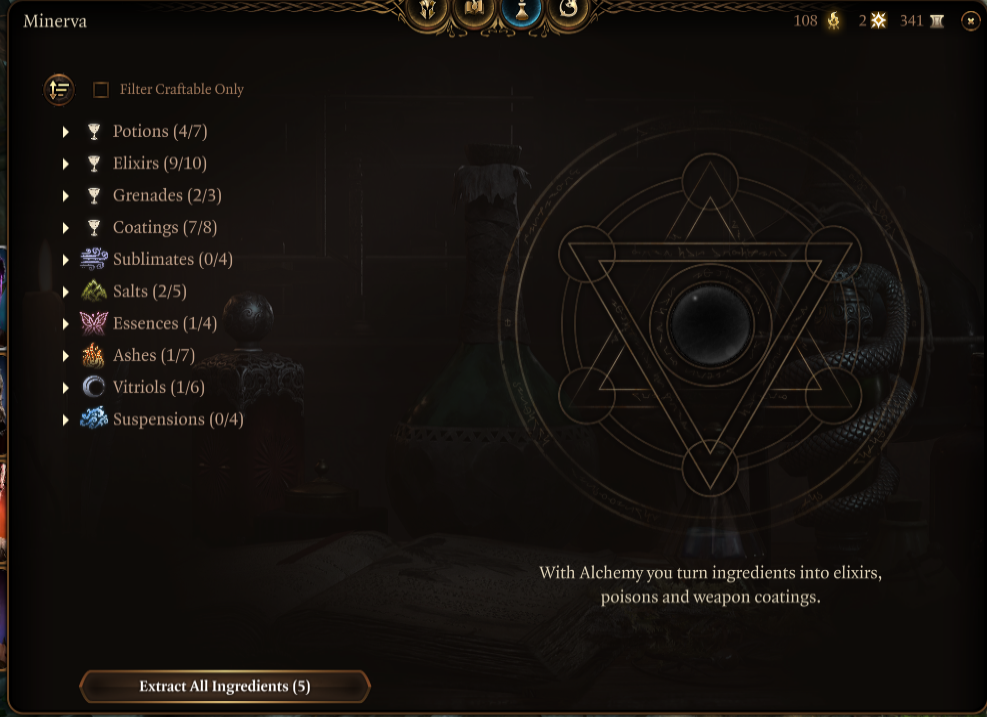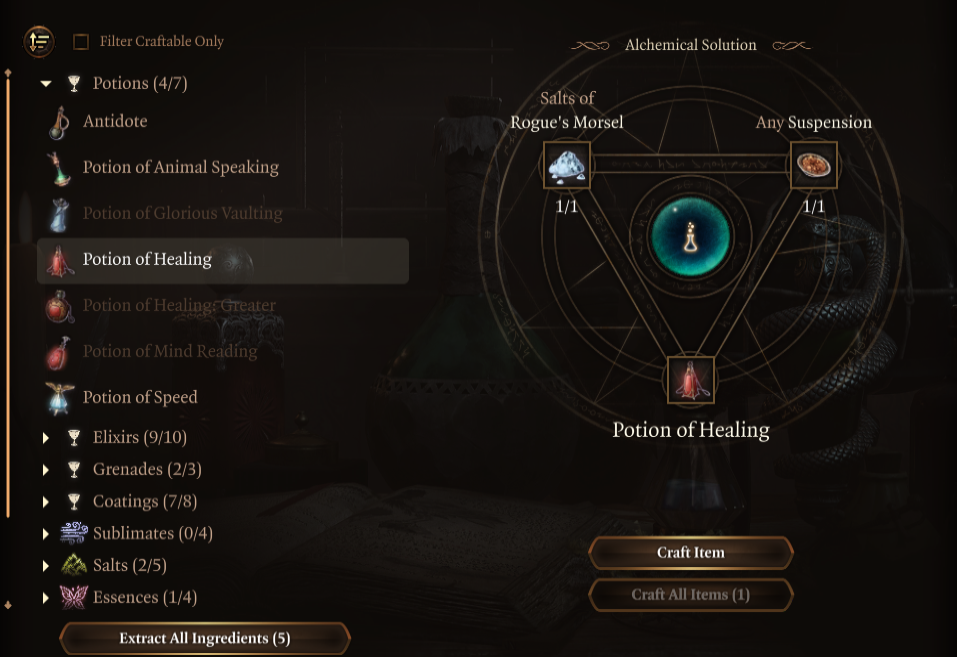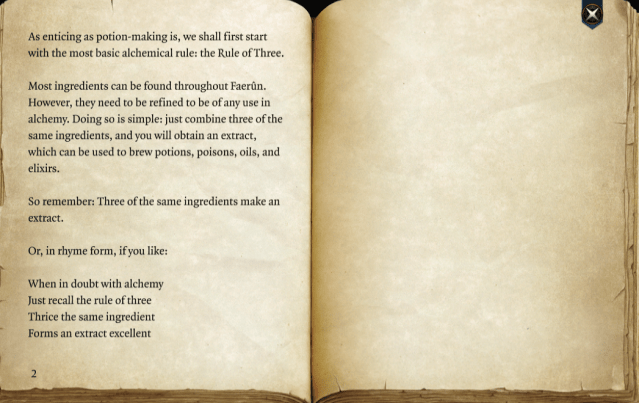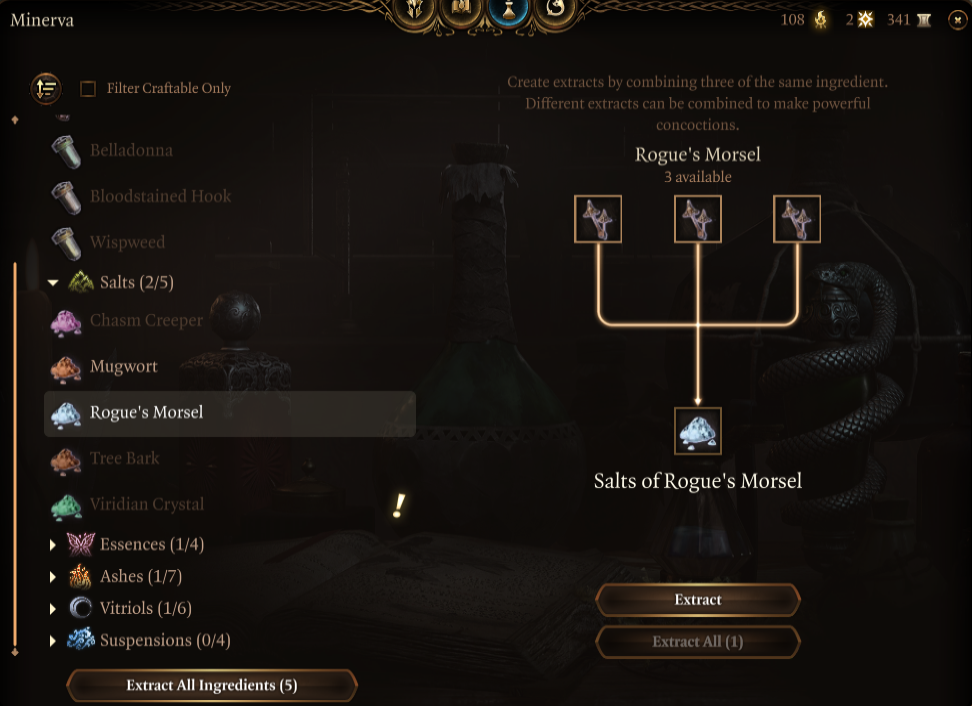Baldur’s Gate 3 has a potion brewing system that may just be the most user-friendly and adaptable of any major RPG. At first glance, it can seem daunting—opening the Alchemy Menu will present you with all sorts of SAT words like “sublimates,” and rather than really seeing upfront recipes, you’ll see options to do things like “extract all ingredients.”
Poke around in the menu even a little bit, and it all becomes very clear. Potion brewing follows a very simple schematic in Baldur’s Gate 3: the Rule of Three. Every alchemy ingredient needs to be collected three times before it can be used in a potion. As a trade-off, ingredients can be used for multiple different potions, meaning there are far fewer ingredients you need to worry about finding.
Baldur’s Gate 3 Potion-making, explained
In Baldur’s Gate 3, you should always pick up every alchemy ingredient you find during your travels, especially as you’re starting out and learning the system. They weigh almost nothing and will be neatly categorized into an Alchemy Pouch, meaning they won’t flood your inventory and cause clutter.
Open the Alchemy Menu by pressing H. You will see a list of categories, like Potions, Elixirs, Grenades, and Coatings. Just beneath this is a list of extraction types; Sublimates, Salts, Essences, Ashes, Vitriols, and Suspensions. Finally, at the bottom, you’ll see the option Extract All Ingredients, possibly followed by a number.

If any of these options do not appear in your Alchemy Menu, it simply means you haven’t found an ingredient yet. It will appear automatically when you have the appropriate ingredient—you do not need to “learn” recipes externally.
There are tons of options for potion crafting in Baldur’s Gate 3, however, the system is still very simple. Each potion will require a specific extraction from a foraged ingredient, as well as one other extraction that only needs to be a certain extraction type—the actual ingredients aren’t important.

For example, a Healing Potion is made by combing a Salts of Rogue’s Morsel with Any Suspension. This means that no ingredient in Baldur’s Gate 3 has one specific use—potion-making is extremely versatile. It’s almost like baking, you can use butter for countless different recipes, and you can always substitute another ingredient for sugar if you’d like.
Extracting ingredients in Baldur’s Gate 3
Remember the Rule of Three, and this part is easy as can be. You can actually find many different Alchemy Books in Baldur’s Gate 3 that will feature the rhyme, “When in doubt with Alchemy, just recall the rule of three. Thrice the same ingredient forms an extract excellent.”

In layman’s terms, combine three ingredients to create an extract. This can be done manually by navigating through the Extract tabs within the Alchemy Menu, or by selecting Extract All Ingredients at the bottom of the menu. If you do not have the option to Extract All Ingredients, you do not have three of a kind of any ingredient.
Related: Baldur’s Gate 3: How to make healing potions in BG3
There are six different types of Extractions in Baldur’s Gate 3:
- Sublimates
- Salts
- Essences
- Ashes
- Vitriols
- Suspensions
Each type has several different ingredients that can form an Extraction. Ingredients will always form a specific Extraction according to the ingredient. For example, the ingredient Belladonna yields a Sublimate of Belladonna when extracted.
Baldur’s Gate 3: All potion recipes

Now that you understand how to create Extractions, let’s take a look at actually combining them to yield potions. As was previously stated, each potion in Baldur’s Gate 3 will require one specific ingredient and one Extraction type.
The recipes for all Craftable Potions in Baldur’s Gate 3 are:
- Antidote: Salts of Mugwort, Any Suspension
- Potion of Angelic Slumber: Essence of Planetar Feature, Any Suspension
- Potion of Animal Speaking: Essence of Acorn Truffle, Any Salt
- Potion of Feather Fall: Sublimate of Autumn Crocus, Any Essence
- Potion of Flying: Sublimate of Eagle Feathers, Any Essence
- Potion of Glorious Vaulting: Sublimate of Wispweed, Any Ashes
- Potion of Healing: Salts of Rogue’s Morsel, Any Suspension
- Potion of Greater Healing: Ashes of Balsam, Any Salt
- Potion of Superior Healing: Salts of Musk Creeper, Any Suspension
- Potion of Supreme Healing: Sublimate of Ki-Rin Hair, Any Ashes
- Potion of Invisibility: Ashes of Imp Patagium, Any Essence
- Potion of Mind Reading: Suspension of Mergrass, Any Sublimate
- Potion of Speed: Ashes of Hyena Ear, Any Salt
As you can see, there are quite a few different ingredients in Baldur’s Gate 3. Don’t get discouraged, however. Simply loot all ingredients you find, and check in every now and then to see what new Extractions or Recipes are available.
Related: All weapon recipes in Baldur’s Gate 3
You really won’t ever have to go out of your way to gather ingredients, just make sure you aren’t ignoring them when you chance upon them. Most importantly, remember the Rule of Three!
Others Asked
What can players exchange for a powerful potion in Act Two of Baldur's Gate 3?
Players can exchange a vial of their blood to Araj Oblodra for a powerful potion.
Where can you acquire the Formula Gruna potion in Baldur's Gate 3?
You can acquire the Formula Gruna potion at Araj's shop in the Lower City of Baldur's Gate during Act Three of the game, after completing a task for Araj in Act Two at the Moonrise Tower.
What is a recommended use for the Potion of Healing in Baldur’s Gate 3?
The Potion of Healing can be used when you don't want to do a full rest but a half rest doesn’t quite top off some of your characters’ health bars. It can also be used in a pinch during combat as a bonus action.
















Published: Aug 19, 2023 10:11 pm